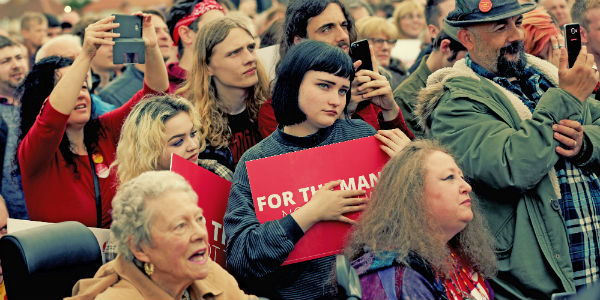Celebrate the transformation of the Labour Party, not the individual who happens to speak for it
Labour lost the General Election and the Conservatives appear intent on striking a deal with the DUP in order to hold onto power. So what is there to celebrate for those on the Left? Lea Ypi argues that the Labour Party is now a reinvigorated force. It is the largest social democratic party in Europe; its members are now at the centre of its values and activity. We should celebrate the movement, and not the individual that happens to speak for it.

Labour supporters on the campaign trail in West Kirby, May 2017. Photo: Andy Miah via a CC-BY-NC 2.0 licence
On the morning of 9 June, many of us on the Left woke up to celebrate the results as if we had won. We had not. We congratulated ourselves as if we had been successful in convincing the British public to care “for the many, not the few”. We were not. We took comfort in the 40% of the electorate that turned up to vote Labour, but we ignored the 60% who chose to act otherwise. We toasted the demise of strong and stable Theresa May. But we forgot that the Tories remain the party with the largest number of votes and strongest parliamentary representation in the country, and that the SNP lost more seats to the Conservatives than to anyone.
Most felt the need to apologise for underestimating Jeremy Corbyn’s leadership skills and electability. But since Corbyn was neither elected Prime Minister nor given much opportunity to display his leadership abilities, some still wondered what exactly was the error for which an apology was required.
What cause is there to celebrate? What grounds for feeling optimistic? Where have critics gone astray? Yes, Theresa May lost her overall majority. But she went on to claim support from the Democratic Unionist Party, a group that is even more bigoted and politically dangerous than the dreaded UKIP. To celebrate this is like celebrating the discovery that the cancer is in your lungs rather than your stomach. If the success of a political party is measured by its ability to win elections, today’s Labour Party has failed as much as its recent predecessors. Are we right to pat each other on the shoulders about a great election night?
Labour is now a nursery of political commitment
We are right, and we should celebrate. But we should celebrate the process, and not the outcome. We should celebrate the movement and not the individual that happens to speak for it. We should celebrate the fact that Labour has become the largest social democratic party in Europe, with a manifesto that recovers the best of its tradition of solidarity, that puts people before markets, that is unapologetically inspired by socialist principles, and that can count on half a million members to campaign on its behalf. We were told that the mass party was a thing of the past, that young people were apathetic. We were told that only money matters in politics. We were told that the media controls our minds.
But we have seen that all of that can be changed. We have witnessed the emergence of what we no longer thought possible: a Labour Party that is shaped and constrained by the collective activity of its members, and that gains strength from exactly this. We have seen once more that a party can be a place of political activism and collective empowerment, a nursery for political commitment.
To be committed to a political project is to believe in a set of principles and to stick with them, even when the polls – or your own party MPs – tell you they are out of step with the times. It is to stay true to a cause you believe in, even as events seem to push the other way, or as the softer supporters drift away. Political commitment is a cornerstone of democracy. Without it, without a vision of political change and the resilience to believe in that vision, power lies undisturbed in the hands of others – in those of the bankers and technocrats of this world, be they outside parliament or inside.
The Labour Party is now well-placed to foster new levels of political commitment. But it can do this only because its members and the things they believe in are once more at the centre of its activities. On election day Labour activists knocked on over a million doors. During the campaign the Labour leader travelled 7,000 miles and spoke at 90 rallies. The Party has just begun to reconnect with workers, migrants, communities, and the vulnerable. It has shown itself able and wiling to hear their views and to construct a platform for change based on ideas they believe in. Its manifesto reaffirmed that a party can be a vehicle for promoting visions of social justice that are constructed through dialogue, including with its internal critics.
The party has set an example for others to follow
Contrary to many of its previous incarnations, the recent Labour Party has shown us what it means to be a party centred on its members and not its high officials, the media, or the market. It has shown what it means to support and promote the political commitment of ordinary men and women and to give them a voice for expressing their grievances and finding alternatives. It has shown us what it means to be a party of principle, one that does not put short-term electoral gains before its moral integrity. It has also shown that electoral gains may someday follow, exactly because such a stance is widely accepted to be the right one.
Labour has set an example for others to follow. It has shown that parties need to engage with ordinary people, with the many, not the few, and help them articulate their concerns intelligently and on a principled basis. It has shown that parties of the Left should set the agenda without capitulating to market orthodoxy or scaremongering about migrants. If any lesson can be drawn from the gains of Labour this election, it is that the Party’s advances are a collective achievement of members won through their boldness and resilience. If parties of the Left regain their commitment to socialist ideals, they have every chance of resonating with popular expectations and becoming engines of radical change. This is not the end of the struggle, and it is not quite a victory yet. But it is a much needed fresh start for the Left, and a model for change across Europe. That in itself is cause for celebration.
This post represents the views of the author and not those of Democratic Audit.
 Lea Ypi is Professor in Political Theory in the Government Department, London School of Economics, and Adjunct Associate Professor in Philosophy at the Research School of Social Sciences, Australian National University. Her co-authored book The Meaning of Partisanship (with Jonathan White) has recently appeared with Oxford University Press.
Lea Ypi is Professor in Political Theory in the Government Department, London School of Economics, and Adjunct Associate Professor in Philosophy at the Research School of Social Sciences, Australian National University. Her co-authored book The Meaning of Partisanship (with Jonathan White) has recently appeared with Oxford University Press.





 Democratic Audit's core funding is provided by the Joseph Rowntree Charitable Trust. Additional funding is provided by the London School of Economics.
Democratic Audit's core funding is provided by the Joseph Rowntree Charitable Trust. Additional funding is provided by the London School of Economics.
There is a danger in filling what is presumed to be intended to be a sane commentary with wild abuse about parties like UKIP, which can claim responsibility for the first stage in restoring democracy and the proper rule of law…which itself would allow Jeremy Corbyn and Labour to introduce laws otherwise barred by membership of the EU. As I have made clear here before (and as indeed the EU Commission has made clear) Corbyn’s planned People’s Quantitative Easing would be struck down by the EU before it even started. All those who howl abuse at UKIP will one day be very thankful to UKIP for being the catalyst for allowing the left to properly govern again.
I was sold on ‘EEC’ membership all those years ago because I was told (quite rightly) that it would enshrine my own right of centre views and that we would never ever have to worry about the ‘lefties’ again. Indeed, Greek voters will confirm that – smashed and crushed by the right, enshrined by the thuggish bullies in Brussels and Berlin who rule Greece as a satrap or colony, democracy torn up and stamped on – no left policies allowed there, thank you, you’re caught in the intended trap.
I later realised myself what a shameful and anti-democratic view that is.
Watching Labour’s John McDonnell on tv interviewed by Robert Peston, insisting that the UK must leave the Single Market, I smiled and realised they had had clearly got it all along…and now they can have confidence that not only can they offer proper policies without the EU fanatics of New Labour briefing against them and smearing them, the UK’s departure from the EU will allow them to implement them.
Think carefully before smearing people as ‘dreaded’ and ‘bigots’ – divisive attacks like that simply make an author appear lacking in sense or political understanding, and spoil any good points made. This is an interesting story and one in which UKIP plays an honourable and useful role for the left (says the party’s former vice chair…).
[…] Source […]